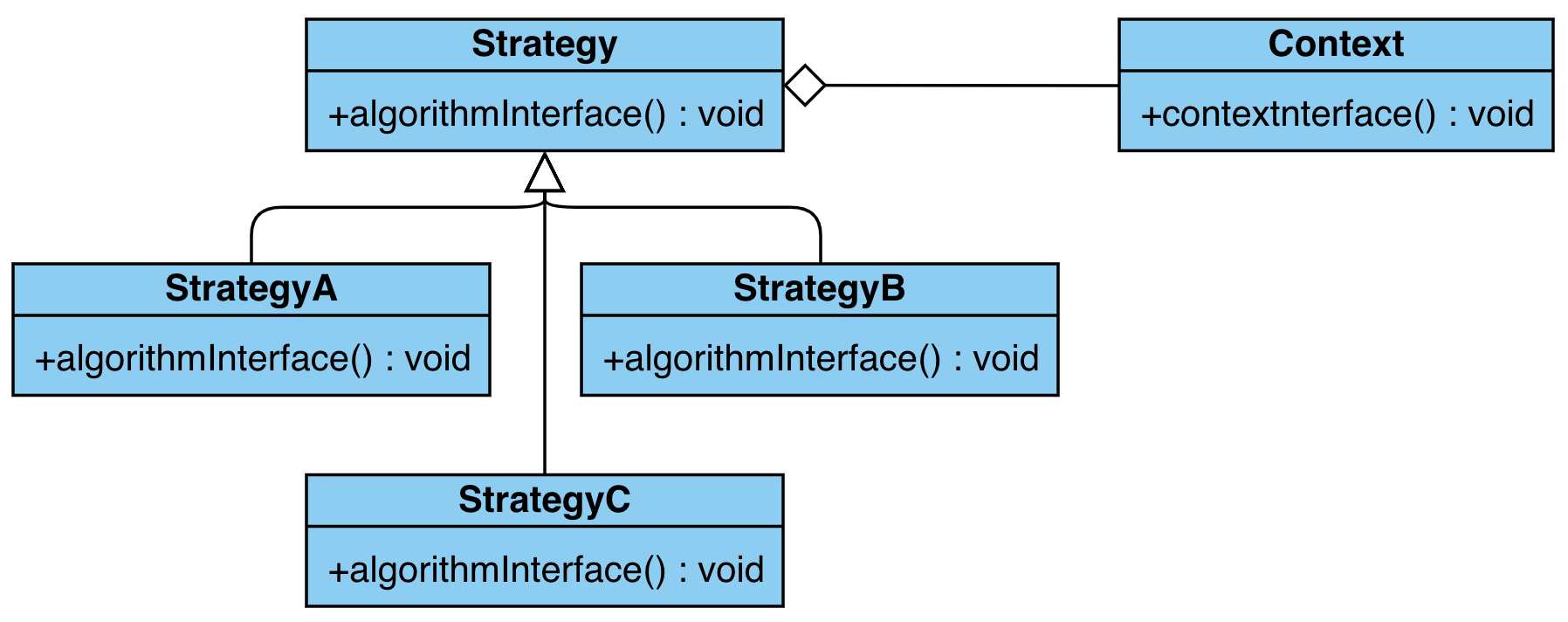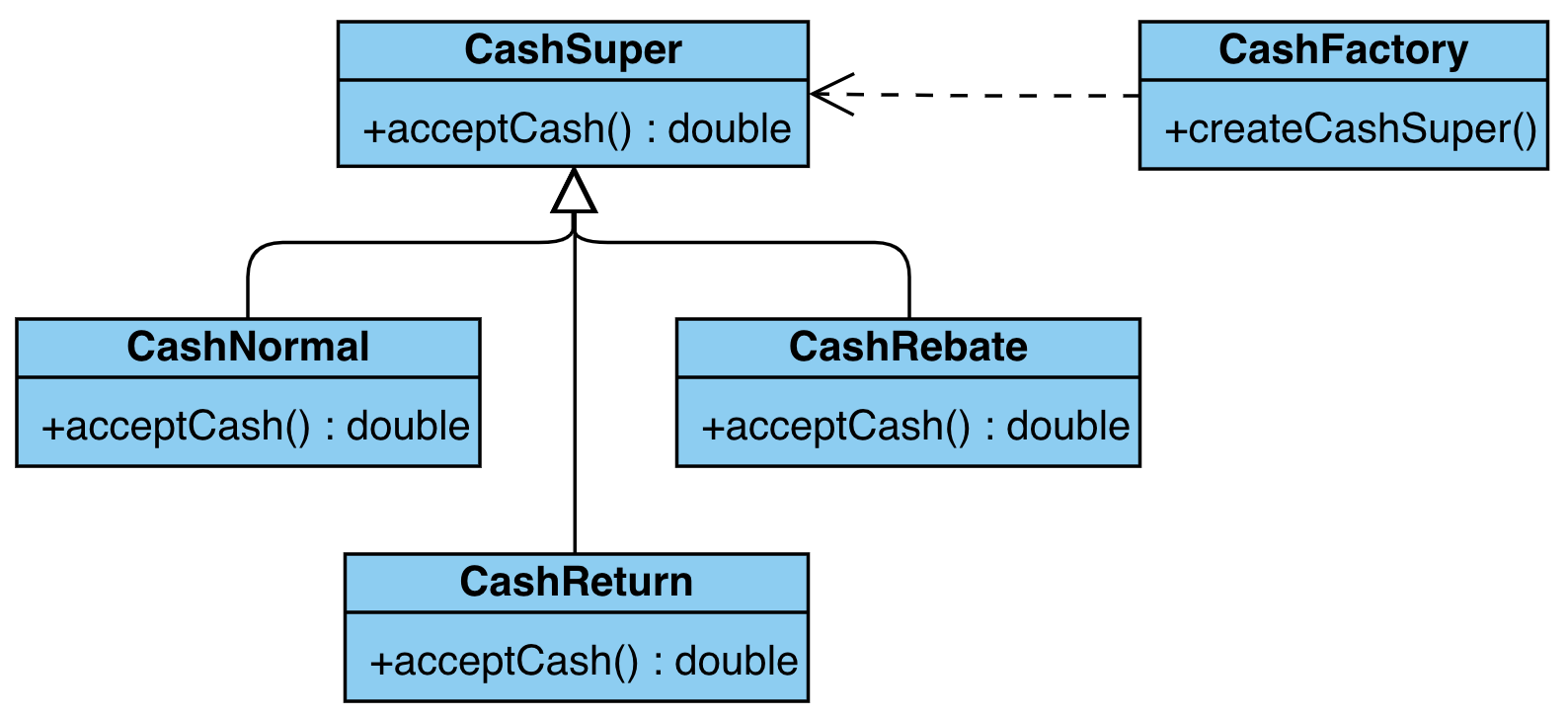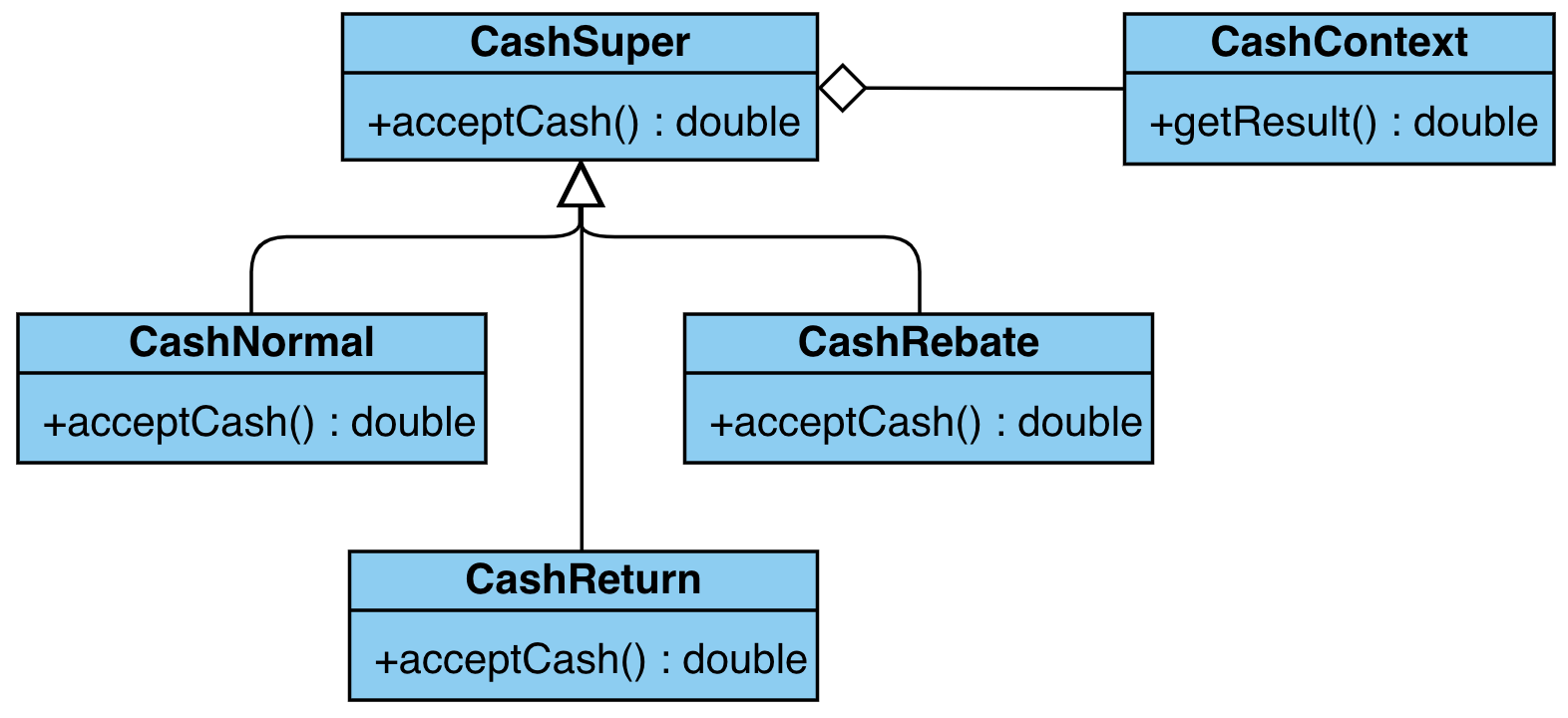策略模式是指对象有某个行为,但是在不同的场景中,该行为有不同的实现算法。
策略模式
UML类图

代码实现
Strategy类
1
2
3
4
5
6
7
8
| package com.lei.designpatterns.strategy;
public abstract class Strategy {
public abstract void algorithmInterface();
}
|
StrategyA类
1
2
3
4
5
6
7
8
| package com.lei.designpatterns.strategy;
public class ConcreteStrategyA extends Strategy{
@Override
public void algorithmInterface() {
System.out.println("Algorithm a.") ;
}
}
|
StrategyB类
1
2
3
4
5
6
7
8
| package com.lei.designpatterns.strategy;
public class ConcreteStrategyB extends Strategy{
@Override
public void algorithmInterface() {
System.out.println("Algorithm b.") ;
}
}
|
StrategyC类
1
2
3
4
5
6
7
8
| package com.lei.designpatterns.strategy;
public class ConcreteStrategyC extends Strategy{
@Override
public void algorithmInterface() {
System.out.println("Algorithm c.") ;
}
}
|
Context类
1
2
3
4
5
6
7
8
9
10
11
12
13
14
15
16
| package com.lei.designpatterns.strategy;
public class Context {
private Strategy strategy;
public Context(Strategy strategy){
this.strategy = strategy;
}
public void contextInterface(){
this.strategy.algorithmInterface();
}
}
|
商场促销
营业员在收银台,需要根据所购买商品的单价与数量,向客户收费。并且需要考虑在不同的场景下,会有不同的打折情况,比如8折或者满减。
简单工厂实现
UML类图

代码实现
CashSuper类
1
2
3
4
5
6
7
8
9
10
11
| package com.lei.designpatterns.strategy;
public abstract class CashSuper {
public abstract double acceptCash(double money);
}
|
CashNormal类
1
2
3
4
5
6
7
8
| package com.lei.designpatterns.strategy;
public class CashNormal extends CashSuper{
@Override
public double acceptCash(double money) {
return money;
}
}
|
CashRebate类
1
2
3
4
5
6
7
8
9
10
11
12
13
14
15
16
17
| package com.lei.designpatterns.strategy;
public class CashRebate extends CashSuper{
private double cashRebate = 1d;
public CashRebate(String moneyRebate){
this.cashRebate = Double.parseDouble(moneyRebate);
}
@Override
public double acceptCash(double money) {
return this.cashRebate * money;
}
}
|
CashReturn类
1
2
3
4
5
6
7
8
9
10
11
12
13
14
15
16
17
18
19
20
21
22
23
24
25
26
27
| package com.lei.designpatterns.strategy;
public class CashReturn extends CashSuper {
private double moneyCondition = 0.0d;
private double moneyReturn = 0.0d;
public CashReturn(String moneyCondition, String moneyReturn){
this.moneyCondition = Double.parseDouble(moneyCondition);
this.moneyReturn = Double.parseDouble(moneyReturn);
}
@Override
public double acceptCash(double money) {
double result = money;
if (money > this.moneyCondition){
result = money - Math.floor(money / this.moneyCondition) * this.moneyReturn;
}
return result;
}
}
|
CashFactory类
1
2
3
4
5
6
7
8
9
10
11
12
13
14
15
16
17
18
19
20
21
22
23
| package com.lei.designpatterns.strategy.simplefactory;
import com.lei.payment.java.base.algorithm.exception.AlgorithmException;
public class CashFactory {
public static CashSuper createCashFactory(String type){
CashSuper cs = null;
switch (type){
case "Normal":
cs = new CashNormal();
break;
case "Rebate":
cs = new CashRebate("0.8");
break;
case "Return":
cs = new CashReturn("300","100");
break;
default:
throw new AlgorithmException("Not support type.");
}
return cs;
}
}
|
策略实现
UML类图

代码实现
CashContext类
1
2
3
4
5
6
7
8
9
10
11
12
13
14
15
| package com.lei.designpatterns.strategy.strategy;
import com.lei.designpatterns.strategy.CashSuper;
public class CashContext {
private CashSuper cs;
public CashContext(CashSuper cs) {
this.cs = cs;
}
public double getResult(double money){
return this.cs.acceptCash(money);
}
}
|
策略与工厂结合
1
2
3
4
5
6
7
8
9
10
11
12
13
14
15
16
17
18
19
20
21
22
23
24
25
26
27
| package com.lei.designpatterns.strategy;
import com.lei.payment.java.base.algorithm.exception.AlgorithmException;
public class CashContext {
private CashSuper cs = null;
public CashContext(String type){
switch (type){
case "Normal":
this.cs = new CashNormal();
break;
case "Rebate":
this.cs = new CashRebate("0.8");
break;
case "Return":
this.cs = new CashReturn("300","100");
break;
default:
throw new AlgorithmException("Not support type.");
}
}
public double getResult(double money){
return this.cs.acceptCash(money);
}
}
|


